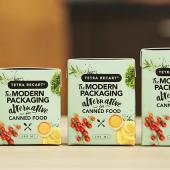As Time Goes By
Bizarre chasms open up in thinking about how our individual and collective future, as one hears repeated, is indissolubly tied to innovation in production processes.
Our GDP will suffer if we are not capable of reducing production costs while maintaining the same quality, and/or offering the consumer new products and services with a greater added value, or that is more personalised. Editorial by Stefano Lavorini
 Photo: foxlife.it
Photo: foxlife.it
A sublime provocation that of Carlo Alberto Carnevale-Maffè, Professor at the Bocconi University in Milan who, intervening at the Economic Packaging Conference1 surprised the audience sustaining that «the functional diaspora of packaging is underway… Up to now packaging has had the purpose of guaranteeing the functional protection of Fast Moving Consumer Goods but today, in its becoming smart, one is heading towards a different synthesis of the old and new functions. In particular, with the explosion of home delivery, packaging changes its nature completely, because it goes directly from the production cycle to that of consumption, skipping the distribution cycle. And in this context the identity of the customer decouples the information between production and the recipient».
And to think that we continue to reason in terms of tons.
To the point where Industry 4.0 is the paradigm that is occupying the information forestage: a mantra true and proper, a magic formula the effectiveness of which “does not depend on the inner participation of the subject that pronounces the same”, but by its very enunciation. This is perhaps why one speaks so much about it, even though but a few are fully aware of its implications, its potentials, its benefits, but also the risks that derive from the same.
There is truly no turning back from the transition underway, which is proceeding in leaps and bounds, even though it is as if most companies (most people) find themselves at ground zero of the fourth industrial revolution: at any rate there is no shortage of ideas about what to do to tackle it, nor is there any shortage of ad hoc devised models (see for example the book Fabbriche 4.0 2).
Indeed the suspicion is that the implementation of the Industry 4.0 paradigm will act as a watershed for the industrial world, both regarding the machine builders and the manufacturers of consumer goods, in fact requiring the expertise and the economic resources virtually exclusively within the reach of the medium-to-large-sized concerns, of which Italy has but few.
In this moment in time what appears worrying are the assumptions of dogmatic positions, like those, in particular, that mistake the need for new expertise and professional profiles imposed by the digitalisation of production, with the requalification of the masses of workers expelled from the productive system due to automation.
Hence it was not by chance that President Mattarella, at the international work Conference (Geneva, June 10) declared: «access to work is a precondition for social inclusion and the development of the individual. Work is one of the most effective infrastructures of peace and peace is only possible with social justice». Stating what is more that commitment is needed against work deprivation, poverty, to avoid uncontrolled migratory movements:
«No to child labor, yes to equality of gender, to safety at work and to the right to collective bartering».
More in general one should avoid correlating technical innovation and ethics: a tricky but essential subject.
Rather one continues to play on people’s fears, not mentioning the actual facts, avoiding exchanges of opinions, and instrumentally ignoring the fact that, when it comes down to it, our time on this earth has a limit to it.
That is one should devote a little more attention to the facts.
And indeed we talked about concrete things, about the technologies that open to digitalisation and represent the future of the industrial world, to some of the protagonists of the SMART area of Cosmopack 2019, which you can read about in the inside pages of this issue. Many the themes touched on: traceability, monitoring and collecting data relative to the functioning of lines and processes for implementing functions and predictive maintenance and to optimize performance, and, again, artificial intelligence, the application of neural networks, machine self-learning faculties…
“As time goes by”, as Sam sang in the film Casablanca… For my part I once again repropose the same question I closed the editorial of the September issue with: «We can either agree with those who sustain that “the question is no longer what we can do with technology, but what technology might do with us”, or else believe that IA is a fairy story, accompanied by a comforting and comfortable moral, hence in the end nothing but good will come out of it for us».
Other interesting scenarios probably exist: let’s talk about them, but – please – let’s cut the blather! Our future and that of the coming generations is at stake.
|
(1) "Economic Packaging Conference: The market of the future”. Meeting organized in Milan on 7 June 2019 by the Italian Packaging Institute, and promoted by Conai. --- (2) Fabbriche 4.0, by Raffaele Secchi and Tommaso Rossi, Università Cattaneo Libri,, Guerini Next, 2018--- |
RELATED ARTICLES: "Italian packaging industry: scenarios and prospects"





















